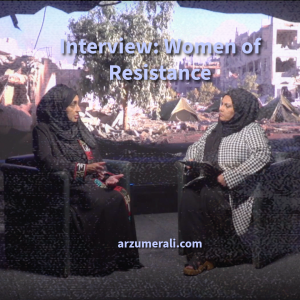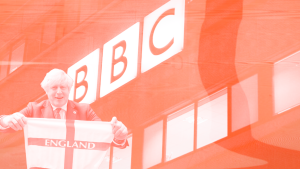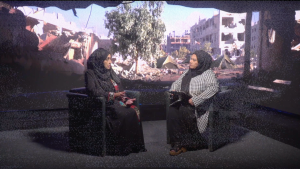Arzu took part in this Press TV show hosted by Sakina Datoo, broadcast in October 2025
A quick transcript using AI of the interview section (from 15 minutes in) is appended below the video.
Sakina Datoo (from 15.41): Joining me in the studio today to discuss Noha’s story is Arzu Merali, writer, researcher, editor, consultant, and producer specializing in the field of human rights. Welcome, Arzu. Thank you for joining me.
Arzu: Thank you for having me on.
Sakina: When Noha talks about her dreams, they’re very simple. Just a bed to sleep on. She just wants to send children to school, a basic house. Yet in the context of Gaza, this looks almost impossible.
Do you think Gaza will ever return to normal?
Arzu: I don’t even know what normal is in terms of Gaza. I’m a believer, so I pray and hope that there is a near victory. But of course, we can see the devastation. It’s a long road to recovery, isn’t it? Unless, of course, there’s very concerted immediate action. We pray for it, we hope for it, we push for it. But it’s astounding, isn’t it, that things have got to this stage?
16:41
Sakina: And we are just about getting a push to allow humanitarian aid in. It’s catastrophic, not just for the people of Gaza, but for the morality of the whole world, really. How on earth has this happened?
Arzu: Absolutely. I’m the generation that grew up watching, let’s leave the war aside, scenes of famine in Ethiopia in the 1980s, and it mobilized a huge, know, well of not just sympathy, but activism to get aid, etc., etc. to enter into Ethiopia and save people who are at, you know, final stages of famine, or not even final stages of famine compared to what’s happening now in Gaza. And we haven’t even had that kind of momentum in the same way now. Yes, people have been on the streets screaming, but that civil society momentum hasn’t been there. It’s a travesty.
Sakina: You talk of Ethiopia, for example, you know, these were natural causes, you know. This is a man-made famine. This food all around except for in this small enclave. It is difficult, know, because we are sometimes we become so desensitized by watching this again and again. But it does it does boggle your mind sometimes to think that how can the world accept this also?
Arzu: You know, I think when it comes to the ordinary people on the ground, they’re not accepting it. They are screaming. And I think it’s a unique moment. I haven’t seen it ever where I feel like. everyone in every house and every street in the world is seeing this and you know, they’re either screaming or praying or trying to you know, express themselves somehow. But we have such a clique of rulers in different countries, whether they call themselves democracies or whether they’re just the old-fashioned authoritarian types not hiding behind anything, right? But also I’m afraid to say a very kind of weak civil society. There’s no fourth estate really holding power to account. Those people in NGOs, etc. etc. – of course there are exceptions to all of this – but they’ve become very socialized to the system. Maybe they’ve just given up on trying to get big asks because they don’t happen anymore. So we are at a very pivotal moment where we have to really find a way of revolutionizing these systems. There isn’t one fix, but we have to try to think it’s very clear now that international systems even you know the way of doing politics nationally now particularly westernized settings is not fit for purpose.
Gaza but there’s also so much that we get from them. Do you think seeing these women who have passed on this resilience from mother to daughter through generations and despite everything you know they are coping they say they’re coping I mean it’s one thing to be able to cope but to actually know, to have the awareness of the fact that I’m going to be able to be okay through this, do you think that this is something that can give the rest of the women in the world the ability to look at this and say, you know what, we need to be a bit more in places of power? It is women who can really bring the actual change into the world?
Arzu: You know, I’d like to think that, but I feel unless we have that kind of revolutionary momentum, what we’re going to end up with is like Hillary Clinton and Theresa May. And I really would not want to see a Muslim or Palestinian alternative that’s like them. Let’s leave that behind now. Definitely, that idea of resilience, generational resilience, we’ve seen it in Kashmir, we’ve seen it around the world, and the women of Gaza are at the forefront of showing the rest of us how it’s done at this particular moment. And there’s a lot to learn.
20:24
But I think also from our point of view of those of us on the outside, you know, looking and struggling, we have to be changing the systems we’re in. It’s not just case of being in that system as a woman, as a Muslim, as a whoever, to try and change it from the inside. It isn’t working anymore. Maybe it never did. And now we can just see it more clearly.
Sakina: Absolutely. Let’s come back to it. But just to remind our viewers, you’re watching Women of Resistance where we highlight the plight of women who have been subjected to a genocide in Gaza.
It’s very interesting, Noha talks about the fact that can Muslim world unite just for once to end the genocide? It looks very simple, a simple request, yet in real sense, this is a no-go area. Can the Muslim world ever unite given the state we are in?
Arzu: What is the Muslim world? If you’re waiting on some kind of, you know, leftover colonial rulers in different countries, they’re not going to do anything, whatever hat they’re wearing, Muslim, this, that or the other. But let’s not forget that actually there has been some kind of unity now. Let’s not forget that there has been Muslim mobilization, both military, whether it’s at a state level or non-state actor level, whether it’s the thousand boat flotilla that’s going to come from Malaysia, whether it’s Lebanon, Iran, Yemen, and all the things they’ve done. So as much as, of course, I feel her frustration but this is new. We’re getting there bit by bit, and it’s not just a case of Muslims uniting, people with a good heart, people who maybe don’t understand how actually much they are on an Islamic path because of that cry of justice from their soul: they’re out on the streets. Things are happening, yes, not fast enough, but they are happening.
Sakina: We’ve seen this, Egyptians, you know, for example, putting some uh food items in bottles and putting them through the sea hoping that they reach Gaza. So the ordinary people, and not just Muslims also, this is a humanitarian, you work in the field of humanitarian rights and stuff, and this is not a Muslim issue anymore. But when it comes to Israel now, oh do you think that they have actually now lost the support everywhere? I mean, they’re scared to travel anywhere, they are being openly shunned by local populations. Just we saw recently, such a huge demonstration in Australia, in Sydney. What do you think is going to happen to Israel? Do you see it imploding?
Arzu: I think we all know it’s imploding. I think they know it’s imploding. That’s why they’ve been engaged in this catastrophic orgy of violence, because it’s their last gasp, to hold on to some kind of power. So I think that’s inevitable now. I think what we thought five years ago, ten years ago, that will it happen in our lifetime. That’s done now. It’s soon.
23:15
The issue is the violence that they’re wreaking at the end of their time is what we’re having to deal with and the repercussions of that afterwards. And I would say as somebody who worked for a while actually trying to bring justice after the Bosnian genocide with many colleagues in Bosnia and over here, for those of us now in the aftermath of this, we must not allow the same mistakes to be made. We should not leave it to international institutions promising that they’re going to get justice for the victims. They won’t all by themselves. We have to mobilize and set up organizations that are going to track down the killers at whatever level. There was a big whitewash at the end of the Bosnian genocide. A few key prosecutions and the people down the chain of command and actually above certain levels of command, they got away with it. We’ve got to go back to the drawing board now and make sure there’s a kind of systematic justice that’s to follow this.
Sakina: And what can we do to push that agenda? So here in the UK, as you know, the UK has been complicit in the genocide fully. But do you think that there is enough awareness? But is there enough for us to be able to reach that stage, to be able to actually make a change at the ballot box? There’s a lot of hope in the new party of Jeremy Corbyn. Do you think there’s enough awakening for a real change?
24:38
Arzu: There’s enough awakening. The issue we have is that we are not really organised enough and we need to have better strategies. I’m not overly hopeful of the new party, as much as I wish them well, because they’re still trying to take part and make the same broken system work. We already saw it doesn’t work. We already saw what happened when he was leader of the Labour Party. We’ve seen the Respect Party coming up doing exactly the same thing, 20 odd years ago after the Iraq war. It’s time we learn, it’s time we change the script. I know it’s not easy, but we can’t just keep making the same mistakes over and over again.
Sakina: We’re almost out of time, but very quickly, where do we get that script? Who is going to lead that? Well, we have leaders around the world, in the Global South, who have been giving different ideas, but also look in our westernised local context. Look at the people who have been talking for a long time. I was part of IHRC. They were talking about Palestine and working across communities with anti-Zionist Jews and other people mobilizing around ideas around the one state solution long before Palestine was a fashionable cause. Look in those directions at the people who have been talking for the longest time. Maybe they don’t have all the solutions, but they certainly have the experience that can be built upon. Let’s not just keep going around with amnesia.
 Sakina: Sounds amazing, and I think that gives a lot of hope because hope is one thing that we definitely cannot lose. That’s all the time we have today for this edition of the program. But we will be back next week. Thank you so much, Arzu, for joining me. Thank you for having me. And thank you for watching. We leave you with the sounds of Palestine by the artist, Saif. Goodbye.
Sakina: Sounds amazing, and I think that gives a lot of hope because hope is one thing that we definitely cannot lose. That’s all the time we have today for this edition of the program. But we will be back next week. Thank you so much, Arzu, for joining me. Thank you for having me. And thank you for watching. We leave you with the sounds of Palestine by the artist, Saif. Goodbye.




